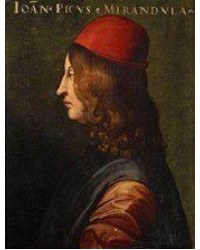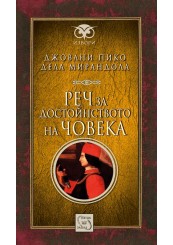Giovanni Pico della Mirandola

Giovanni Pico della Mirandola (1463–1494) was an Italian Renaissance nobleman and philosopher. He was the founder of the tradition of Christian Kabbalah, a key tenet of early modern Western esotericism. He is famed for the events of 1486, when, at the age of 23, he proposed to defend 900 theses on religion, philosophy, natural philosophy, and magic against all comers, for which he wrote the Oration on the Dignity of Man, which has been called the "Manifesto of the Renaissance", and a key text of Renaissance humanism and of what has been called the "Hermetic Reformation". His 900 Theses was the first printed book to be universally banned by the Church.
His father, Giovanni Francesco Pico, prince of the small territory of Mirandola, provided for his precocious child’s thorough humanistic education at home. Pico then studied canon law at Bologna and Aristotelian philosophy at Padua and visited Paris and Florence, where he learned Hebrew, Aramaic, and Arabic. At Florence he met Marsilio Ficino, a leading Renaissance Platonist philosopher.
Introduced to the Hebrew Kabbala, Pico became the first Christian scholar to use Kabbalistic doctrine in support of Christian theology. In 1486, planning to defend 900 theses he had drawn from diverseGreek, Hebrew, Arabic, and Latin writers, he invited scholars from all of Europe to Rome for a public disputation. For the occasion he composed his celebrated Oratio. A papal commission, however, denounced 13 of the theses as heretical, and the assembly was prohibited by Pope Innocent VIII. Despite his ensuing Apologia for the theses, Pico thought it prudent to flee to France but was arrested there. After a brief imprisonment he settled in Florence, where he became associated with the Platonic Academy, under the protection of the Florentine prince Lorenzo de’ Medici. Except for short trips to Ferrara, Pico spent the rest of his life there. He was absolved from the charge of heresy by Pope Alexander VI in 1492. Toward the end of his life he came under the influence of the strictly orthodox Girolamo Savonarola, martyr and enemy of Lorenzo.
Pico’s unfinished treatise against enemies of the church includes a discussion of the deficiencies of astrology. Though this critique was religious rather than scientific in its foundation, it influenced the astronomer Johannes Kepler, whose studies of planetary movements underlie modern astronomy. Pico’s other works include an exposition of Genesis under the title Heptaplus (Greek hepta, “seven”), indicating his seven points of argument, and a synoptic treatment of Plato and Aristotle, of which the completed work De ente et uno (Of Being and Unity) is a portion. Pico’s works were first collected in Commentationes Joannis Pici Mirandulae (1495–96).


